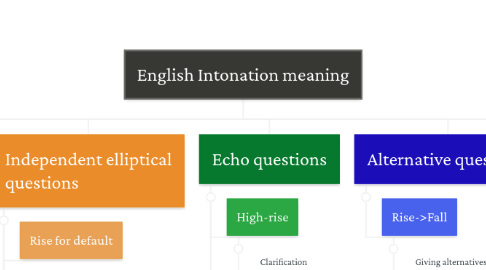
1. Statements
1.1. Fall
1.1.1. Complete, confident, definite and unreserved.
1.2. Rise, fall-rise or mid level
1.2.1. Non-finality
1.2.2. Fall-rise: Implicational, polite, negative statements.
1.3. Low-rise
1.3.1. Lack of support
1.3.2. High-level -> Low rise: Soothing and reassuring.
2. Common questions
2.1. Wh- questions
2.1.1. Fall by default.
2.1.2. Rise or fall-rise: Gentle, sympathetic and diferential. "Interested rise"
2.2. Yes-No questions
2.2.1. High-level->Rise
2.2.2. Fall: Insistent and urgent.
3. Echo questions
3.1. High-rise
3.1.1. Clarification
3.2. Rise
3.2.1. Focus
4. Question tags
4.1. Rise
4.1.1. Ask for information
4.1.2. Softened
4.2. Fall
4.2.1. Appeals for agreement
4.2.2. Insistent
5. Independent elliptical questions
5.1. Rise for default
5.2. Fall
5.2.1. Slight surprise
5.3. Falling
5.3.1. Exclamatory purposes
6. Alternative questions
6.1. Rise->Fall
6.1.1. Giving alternatives.
7. Exclamations
7.1. Fall
7.1.1. What and How
7.1.2. Interjections and statements
7.1.3. Negative yes-no questions
8. Commands
8.1. Fall by default
8.1.1. Fall-rise
8.1.1.1. Warning
8.2. High-level->Low-rise
8.2.1. Softened
9. Formulaic expressions
9.1. Fall (normally)
9.2. Rise
9.2.1. To keep the conversation going.
9.3. Low-fall
9.3.1. Formal "thank you"
9.4. High-fall
9.4.1. Surprise
9.5. Rise.
9.5.1. Routine acknowledgement.
